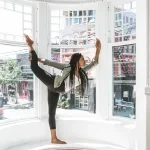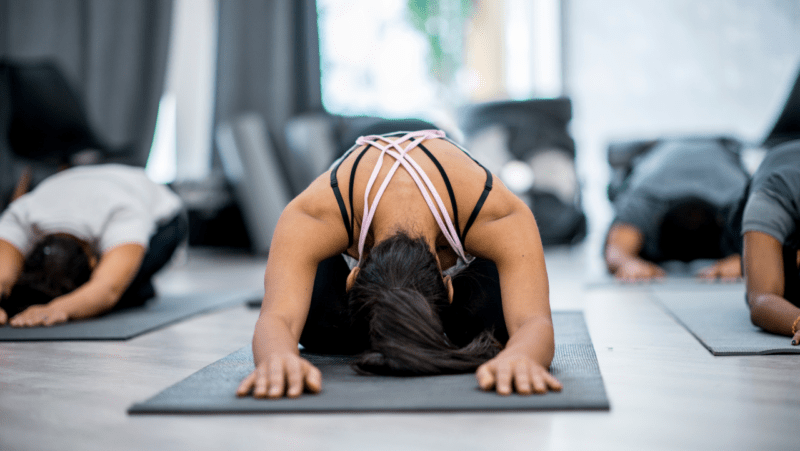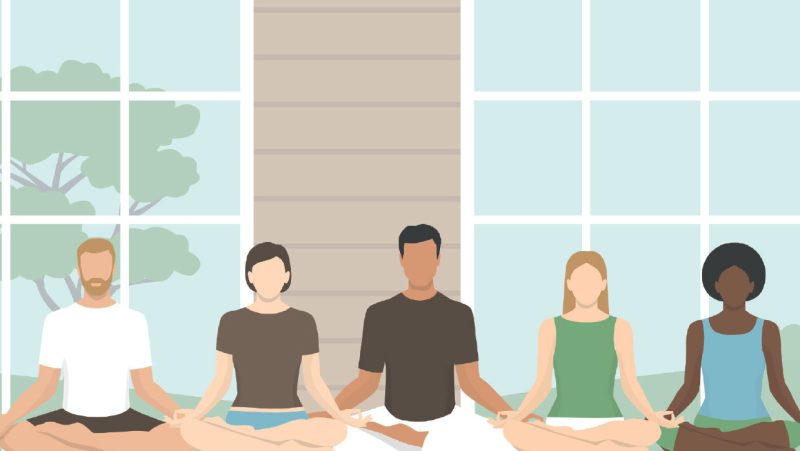
Yoga as a Revolutionary Tool for Healing Black Women
Yoga as a Catalyst for Transformation: Empowering Mental Health and Community Among Black Women - By Tai Salih
Reading time: 5 minutes
Yoga holds immense potential to revolutionize the mental health and well-being of Black women. In a society marked by systemic devaluation and oppression, Black women have long grappled with disproportionate levels of stress, anxiety, depression, and other mental health challenges. Yet, within the practice of yoga, there exists a transformative path towards healing and self-discovery—a path that offers Black women the means to reclaim control over their well-being in a truly revolutionary way.
The profound beauty of yoga extends beyond its role as a mere physical exercise; it serves as a potent tool for nurturing self-awareness, resilience, and community. Through the practice of yoga, Black women can acquire the skills to effectively manage stress and anxiety, thereby breaking free from harmful coping mechanisms that have plagued their lives. By embracing the mindfulness aspect of yoga, Black women can forge deeper connections with their bodies and emotions, fostering an inner strength and empowerment that empowers them to confront the multitude of challenges they encounter with newfound ease and confidence.
Indeed, the beauty of yoga lies in its multifaceted capacity to cultivate self-awareness, resilience, and community. Through the practice of yoga, Black women not only unearth means to manage stress and anxiety, but they also unlock pathways to inner strength and empowerment, equipping them to navigate life's obstacles with newfound confidence.
Moreover, yoga beckons the opportunity to foster community among Black women—a particularly vital prospect given the historical isolation and disconnection that many have experienced. For far too long, Black women have been forced to tread their paths alone, disconnected from a sense of belonging and support. By participating in group yoga sessions, Black women can weave a supportive community—one that acknowledges and values their unique experiences and struggles, while nurturing a profound sense of solidarity and mutual support.
This revolutionary concept of building community among Black women through yoga bears the transformative potential to empower them with connections that resonate with their experiences and challenges. Such connections can serve as a catalyst for change, not only in their individual lives but also on a larger societal scale. The practice of yoga thus emerges as a vehicle through which Black women can reclaim their sense of self and seize control of their mental health and well-being—a truly radical act of self-love and self-care.
Scientifically, yoga has been demonstrated to reduce cortisol levels, the stress hormone, in the body. This aspect holds particular significance for Black women who frequently contend with elevated stress levels due to systemic racism and discrimination. Numerous studies corroborate that yoga effectively diminishes anxiety symptoms, such as worry, nervousness, and fear. It enables Black women to harness the power of healthy stress and anxiety management, replacing unhealthy coping mechanisms, such as substance abuse or overeating, with mindful practices.
Yoga's efficacy in alleviating stress and anxiety is underpinned by its ability to induce relaxation in both the mind and body. Achieved through the practice of yoga poses, or asanas, this relaxation hinges on focused attention and mindfulness. Additionally, yoga encompasses essential breathing exercises, known as pranayama, that serve to calm the mind and mitigate anxiety.
Yoga's transformative influence extends to mood enhancement and the alleviation of depressive symptoms. A study featured in the Journal of Alternative and Complementary Medicine found that yoga outperformed standard care in reducing depression symptoms among women. Furthermore, scientific inquiries underscore that regular yoga practice elevates serotonin and dopamine levels in the brain—neurotransmitters associated with happiness and well-being.
The physical dimension of yoga further contributes to mood improvement. Engaging in physical activity activates the release of endorphins—natural mood boosters. This holds significant promise for Black women grappling with depression symptoms, fostering a more positive and energized outlook.
Self-awareness is a cornerstone of mental health, especially for Black women navigating systemic oppression, which can often lead to a sense of disconnection from their bodies and emotions. Through yoga, Black women can hone their ability to listen to their bodies and attune themselves to their emotional needs, ultimately fortifying their overall mental health and well-being.
Mindfulness lies at the heart of yoga's capacity to heighten self-awareness. By anchoring themselves in the present moment and their breath, individuals become more attuned to their thoughts and emotions. This mindfulness practice empowers Black women to process their emotions, including anger, sadness, or frustration, in a healthy and constructive manner.
Resilience—the ability to surmount challenges and rebound from adversity—is of paramount importance, particularly for Black women who frequently encounter multifaceted challenges in their lives. Through yoga, they cultivate the strength to persevere, pushing through demanding poses and remaining present in discomfort. This resilience extends beyond the yoga mat, equipping them to face life's hurdles with greater ease and determination.
Moreover, yoga fosters a profound sense of inner strength and empowerment. As Black women take charge of their bodies and minds through yoga, they nurture an enhanced sense of self-efficacy—a belief in their capacity to handle challenging situations. This newfound self-assurance empowers them to navigate personal and professional challenges with heightened confidence and poise.
Yoga carries the potential to forge a sense of community—an invaluable asset for Black women who may grapple with isolation and disconnection from others. Although many mainstream yoga studios may not offer classes specifically tailored to Black women, an increasing number of community groups and collectives have emerged to bridge this gap, providing a welcoming space where Black women can be seen and heard.
This sense of community transcends mere camaraderie; it plays a pivotal role in reducing feelings of loneliness and depression. By connecting with others on similar journeys, Black women find solace in the knowledge that they are not alone in their struggles. This camaraderie contributes significantly to improving overall mental health and well-being.
Yoga emerges as a revolutionary instrument capable of transforming the mental health and well-being of Black women. By embracing yoga, Black women access a profound reservoir of self-awareness, resilience, and community, empowering them to traverse life's trials with newfound ease and confidence. This constitutes an audacious act of self-love and self-care with the potential to effect change not only in the lives of Black women but also in the broader societal landscape.







